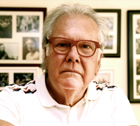Yet another refugee from the state public service has found himself a senior position in Kevin Rudd’s Canberra bureaucracy.
He is Robert Griew who has become the associate secretary to the head of the federal Department of Education Lisa Paul, a Howard appointee. After a six-month search, Griew replaces Finn Pratt who departed late last year to become CEO of Centrelink.
What’s surprising about Griew’s appointment to Julia Gillard’s department is that his background is health not education.
During his NSW career, Griew has been a board member of the NSW Legal Aid Commission and Australian Hearing and was appointed an associate professor of the School of Public Health and Community Medicine at the University of NSW.
As CEO of the AIDS Council of NSW (ACON), Griew he led a revision of the vision and identity of the organisation and represented ACON on multiple policy and representational forums. These included the NSW Committee on HIV/AIDS Strategy, the Executive of the Australian Federation of AIDS Organisations and the Intergovernmental Committee on Hepatitis, AIDS and Related Diseases.
On July 7 last year Griew became Deputy Secretary, Office for Children and Early Childhood Development, in Victoria.
Before taking his job with the Brumby Government, Griew served as CEO of the Department of Health and Community Services in the Northern Territory. His four-year term covered the tumultuous period leading up to the Howard Government’s 2007 intervention when the army, the Australian Federal Police, doctors, nurses and carers were deployed to handle the social emergency in Aboriginal communities.
In his CV, Griew says that the Darwin position with Clare Martin’s Government gave him responsibility for “the delivery of acute, primary and population health services to the most dispersed population in Australia, of which 30% are Aboriginal people”.
Griew has also run his own private consultancy based in Sydney trading as Robert Griew Consulting. In 2008 he co-wrote a paper funded by the Office for Aboriginal and Torres Strait Islander Health and the Department of Health and Ageing on”the link between primary health care and health outcomes for Aboriginal and Torres Strait Islander Australians”. His co-authors were Edward Tilton and Nick Cox.
As the former head of the Office of Aboriginal and Torres Strait Islander Health, following the transfer or responsibility from ATSIC to the Commonwealth Health Department in 1995, Griew was well placed to conduct the survey a decade later.
In early 2007 he became a board member of the Australian Institute of Health Policy Studies (AIHPS) at the same time as Philippa Smith, head of the Association of Superannuation Funds of Australia.
In an interview on the institute’s website, Griew was asked, “What motivated you to work in the health sector/chosen field?” and the edited reply states:
Robert was always interested in work in human services. His first jobs were in children’s services and it is through his interest in early childhood policy that he joined the public service. He has always been engaged in children’s interests and believed that we need to do better in the integration of thinking about child development, health and welfare.
In the early 1980s he did a student placement in an Aboriginal community on the NSW south coast. In the mid 1990s he became responsible for the national Aboriginal health program. Both experiences reinforced his belief in the imperative of integrated children’s policy.
What do you hope to achieve in your position?
He is interested in the possibility of promoting Aboriginal health policy and intersectoral thinking about children’s health development and welfare through his involvement with AIHPS.
Canberra watchers will be keen to observe how he handles the transition from health to education.








Crikey is committed to hosting lively discussions. Help us keep the conversation useful, interesting and welcoming. We aim to publish comments quickly in the interest of promoting robust conversation, but we’re a small team and we deploy filters to protect against legal risk. Occasionally your comment may be held up while we review, but we’re working as fast as we can to keep the conversation rolling.
The Crikey comment section is members-only content. Please subscribe to leave a comment.
The Crikey comment section is members-only content. Please login to leave a comment.